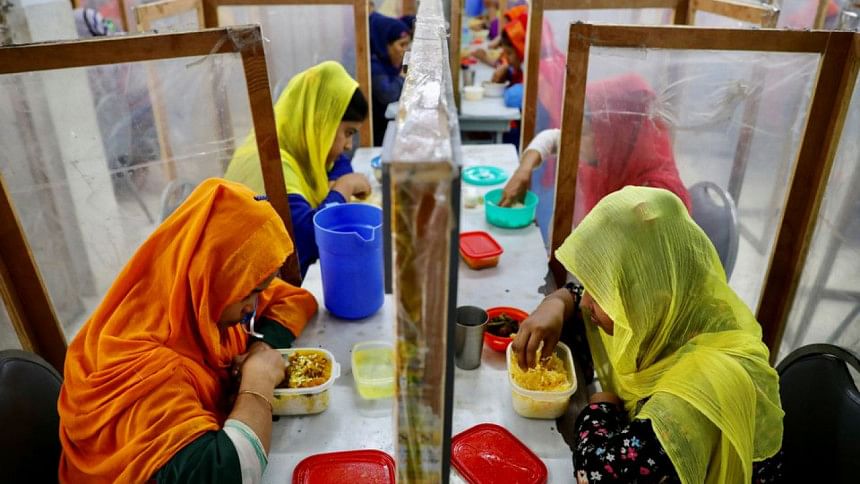Accord signatories enter new pact

The former signatories of the Accord Bangladesh have joined together to continue their legally binding commitments to workplace safety in Bangladesh and expand the programme to other countries.
Yesterday, they announced the formation of the International Accord for Health and Safety in the Textile and Garment Industry.
In Bangladesh, the agreement is already implemented by the independent national tripartite platform named RMG Sustainability Council (RSC), consisting of brands, unions and industry.
"This agreement covers all RMG suppliers producing in Bangladesh for the signatory companies," according to the agreement.
The new pact takes effect on September 1, 2021 after the Accord on Fire and Building Safety in Bangladesh expires on August 31.
NGO signatories to the Bangladesh Accord welcomed the new agreement.
Like its predecessor, the new arrangement is a legally binding agreement between companies and trade unions to make the ready-made garment and textile factories safe.
"The renewed agreement advances the fundamental elements like respect for freedom of association, independent administration and implementation, a high level of transparency, provisions to ensure remediation is financially feasible," said the Bangladesh Accord in a statement.
Key new features of the International Accord include a commitment to focus on the health and safety program in Bangladesh and on building a credible industry wide compliance and accountability mechanism.
"Starting today, the trade union signatories, IndustriALL Global Union and UNI Global Union will join along with leading brands into this new agreement," the statement said.
On September 1, the Accord will announce the first wave of brands and retailers that have signed the agreement.
In a statement, H&M, one of the signatories, said: "We are pleased to have signed a new agreement, called the International Accord for Health and Safety in the Textile and Garment Industry, with trade unions and other brands to continue our joint efforts to ensure a safe work environment in Bangladesh's garment industry."
The Accord has brought in a remarkable change in the textile industry, said Masarrat Quader, public affairs and stakeholder engagement manager of H&M Group.
"I'm proud to have been a part of fruitful and important discussions with other brands and trade unions leading up to this ground-breaking agreement."
Miran Ali, vice-president of the Bangladesh Garment Manufacturers and Exporters Association, said they were aware about the formation of the international accord.
He, however, said the accord was for other countries, not for Bangladesh.
He said the RSC had already been formed, and it was functioning in Bangladesh after the Accord for Bangladesh Workers Safety departed.
The International Accord has been formed to strengthen the safety in the garment factories outside of Bangladesh, said a retailer of a European retailer having an office in Bangladesh.
On June 1, 2020, the RSC took over the Accord in Bangladesh with the mandate to continue with factory inspections, remediation monitoring, and workplace programmes.
However, the RSC did not take over one unique portion of the accord - the ability for retailers to be tried in court in the country in which they are domiciled if they fail to meet their obligations, including cutting ties with factories that do not meet the Accord's standards, reported Reuters yesterday.
This has now been extended until the end of October 2023, according to a copy of the agreement seen by Reuters.
Signatories also agreed to discuss within six months which countries the International Accord could be extended to, with the aim of establishing it in at least one other country within two years.
In a joint statement, the Clean Clothes Campaign, Worker Rights Consortium, Maquila Solidarity Network, and Global Labor Justice-International Labor Rights Forum, said: "We welcome, and look forward to signing, this new international safety agreement, which maintains the vital elements of the ground-breaking model established by the Bangladesh Accord.
The vital elements are legal enforceability of brands' commitments, independent oversight of brand compliance, the obligation to pay prices to suppliers sufficient to support safe workplaces, and the obligation to cease doing business with any factory that refuses to operate safely.
"The successful outcome of negotiations this summer will ensure that the sweeping safety gains the Accord have delivered in Bangladesh will be maintained and extended."
The model will also now be expanded to other countries where workers' lives remain daily at risk, said the NGOs.
Only brands that are willing to sign the new agreement will be able to avail themselves of inspections and other services from the RSC, ensuring a level-playing field without a double standard for brand accountability, the rights groups said.
Ineke Zeldenrust, the international coordinator at the Clean Clothes Campaign, said: "This agreement will begin the long-awaited expansion of this model that holds brands legally accountable to other countries where workers' lives continue to be at risk."
Scott Nova, executive director of the Worker Rights Consortium, said: "Garment workers in Bangladesh used to die in the dozens and hundreds making T-shirts and sweaters for the world's leading apparel brands."
"The Accord put an end to that horror. Provided enough brands sign, this new agreement will ensure it never returns."

 For all latest news, follow The Daily Star's Google News channel.
For all latest news, follow The Daily Star's Google News channel. 



Comments